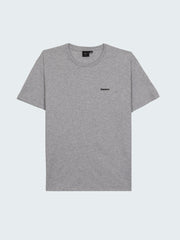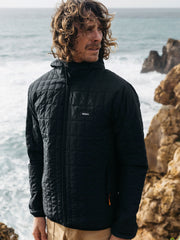We sat down with Tonic Surf Founder Kwame Salam, who joined us for our winter adventure on the Welsh coast. As well as giving some local knowledge to the crew, Kwame talked to us about moving to Wales in his mid-teens, the profound impact that surf therapy can have, and his commitment to connect more black and mixed-race families to the sea.
Kwame Salam: Nature's Tonic
“It's a ritual. It just keeps me nice and balanced.” Kwame Salam joins our conversation fresh from his morning swim in the ocean – a ‘non-negotiable’ part of his daily routine. Based at Poppit Sands in west Wales, he leads the surf therapy organisation Tonic Surf, using the power of the sea to help heal individuals and connect communities. “The name Tonic comes from the Welsh word Ton, which means wave,” he explains. “That combined with it being a ‘tonic’ in the healing sense, is where it came from.”
Having moved to Wales from London in his early teens, Kwame has been surfing this coastline for nigh on 30 years. He now feels deeply connected to the area, but at first the transition was anything but easy. “I was really into my skating as a kid, I was a sponsored skater. But obviously… there’s barely any concrete here! We were near the coast though, so a lot of friends were surfing and they got me into it.”
“Moving up was a huge shock to the system.” he explains, recalling his first day, “I was 13, moving to a school that was predominantly Welsh speaking. In my first assembly, I’m the only black kid in the school. And there’s a language barrier as well. I didn't even know to expect it, because when we came to visit, it was school holidays. So yeah, bit of a culture shock!”
Despite these challenges Kwame fell in love with the landscape and stunning coastline around him, deciding to stay in Wales and put down roots. Over the subsequent years he has embedded himself in the community, with Tonic surf providing a touchpoint that connects many in the area. Having fallen in love with the sea, and benefitted himself from the healing that it facilitates, as Kwame deepened his connection to the coast he was compelled to share this with others.
“I've run a surf school for 22 years now, and I'm well known because of what we do. We work with hundreds of people a year, so almost everyone in the area knows someone that's been through our program,” he explains, as we go back to how his journey into surf therapy began. “We were doing a project 15 years ago called Surf-able. It was sort of the founding moment with everyone in surf therapy – the founders of the Wave Project were part of it, we were part of. At the time it was the first and only disability focussed surf initiative that was spread over the UK.”
Since then, Tonic Surf has grown from strength to strength, including a course for veterans and bringing in what Kwame calls their Global Majority Group. “It's a term that's slowly taking off, and it makes sense when you think about it,” he says with a smile. “It's a black and mixed race group where we bring together people who’ve moved to the area to share their stories. We've got quite a few kids that have been adopted that are black, and parents wanting to understand how to bring up their kids. I've got kids who are learning how to treat their afros properly, because they've got white parents who just don’t know.”
This chance to connect black and mixed-raced families to the ocean is something Kwame is incredibly passionate about, and slowly he is seeing a change in that cultural stereotype. “I’ve had Nigerian families come up to me with kids telling me their parents said they couldn’t surf – because it’s just culturally not something that we do,” he says with a sigh, “But there's been a big shift in the last year or two, I'd say. It's just a big education thing. Anyone can see our groups running, and then we explain what's going on and they love it.”
Through their work with adults, children and veterans, Tonic surf have championed the effectiveness of surf therapy and how it can have lasting effects that go beyond the end of the formal 10 week course. “If you give someone a recovery tool and then the funding runs out… well then they've got nothing, and that's even worse,” Kwame explains, having seen people come back after a winter without therapy, who have reverted to old ways without that structure in place. “With our program we try to get them integrated into the ocean community,” he continues, “We help them become ocean guardians, doing coastal care work, beach cleans, etc. so that when we're not working together anymore, they can still carry on and feel a connection to the sea and the community.”
For those who have been involved in surf therapy, or seen it in action, it’s difficult to dispute the impact it can have on the participants. Children come out of their shells, forgetting their worries, and hardened war veterans have found compassion and connection to help heal from their trauma.
“I personally feel that it's not so much the activity as it is the nature connection. Surfing's just the tool,” Kwame reasons when asked why and how he believes surf therapy works. “We’ve got stunning coastlines and, I’ll be honest, I’d say 60% of our participants don’t really surf. But I think it’s the mindfulness that you get when you're in the water specifically, or just in that environment. If you catch a good wave, or you fall off, or you just see the twinkle of the water. Whatever it is, you can't help but 100% be in that specific moment. So I think for many people, it's just an eco-therapy.”
“At the end of the day, you feel better when you go to the beach, don't you? It's pretty basic.”





















































































